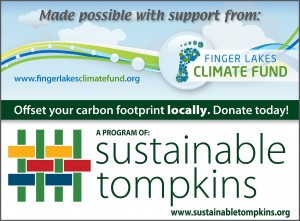Back in Septem ber, members of Sustainable Tompkins joined the People’s Climate March in NYC to affirm our moral responsibility for reducing carbon emissions and heading off catastrophic climate disruption. We know there is a challenging and lengthy journey to meet that commitment, but the harmful consequences of inaction inspire our resolve. Our movement can’t be afraid of the difficult conversations and points of friction, and must access the courage of our convictions.
ber, members of Sustainable Tompkins joined the People’s Climate March in NYC to affirm our moral responsibility for reducing carbon emissions and heading off catastrophic climate disruption. We know there is a challenging and lengthy journey to meet that commitment, but the harmful consequences of inaction inspire our resolve. Our movement can’t be afraid of the difficult conversations and points of friction, and must access the courage of our convictions.
ST has devoted much of the past five years to helping our community reduce its dependency on fossil fuels and choose to invest in energy efficiency, demand management, and renewables. Our Finger Lakes Climate Fund helps lower-income families reduce their energy bills, while our Finger Lakes Energy Challenge helps households and businesses design their own path to true energy security. Our conferences, salons, and workshops support our community’s growing understanding of the essential need for and viability of a low-carbon energy economy.
But now our community is facing a “Keystone” moment on the climate front, and ST’s focus is on preventing a significant increase in our reliance on fossil fuel.
The Keystone XL pipeline is just one high-profile example of the widespread rush to make large, long-term capital investments in fossil fuel infrastructure that will lock in a dangerous increase in carbon emissions for several decades. It’s obvious to many that the proposed gas depot under Seneca Lake and the repowering of the Cayuga power plant are risky investments being forced upon residents and ratepayers. It is perhaps less obvious that the proposed 7-mile gas pipeline through Dryden to Lansing is a similar threat to our long-term energy security and our county’s goal of reducing emissions 80% by 2050.
ST has been helping to organize a group of about 40 local residents and clean energy experts that is investigating the implications of the Dryden pipeline proposal in comparison to less risky energy alternatives for housing development and business expansion in Lansing. The $14-million, 10-inc h pipeline could supply methane gas to 40-60,000 households and seems greatly oversized for a “reinforcement” project to service expansion of existing businesses near the airport. (There are about 38,000 households in our county; many already serviced by natural gas.)
h pipeline could supply methane gas to 40-60,000 households and seems greatly oversized for a “reinforcement” project to service expansion of existing businesses near the airport. (There are about 38,000 households in our county; many already serviced by natural gas.)
We have shared our concerns with county legislators about the need for coordination of our climate goals with economic development strategies, and about the potentially false assumptions that are driving the pipeline’s advocates to insist that it is necessary and beneficial. Part of our effort is to protect the interests of the landowners along the route from an exceptionally unfair pipeline easement and eminent domain proceedings by NYSEG (now owned by Iberdrola in Spain). But an equally critical part of our campaign is to take an in-depth look at the short and long-term costs of powering new development with methane versus locally- and renewably-sourced biomass and electricity. We hope to be ready next month with our analysis, and will seek out conversations with local business leaders and elected officials to learn together how we can accept our climate responsibilities while also meeting the need for affordable housing and meaningful employment in Tompkins County.
The Keystone principle of avoiding new investments in fossil fuel is really just simple common sense. We know that we are already looking at damaging impacts and increasing costs from climate change and increasingly radical fossil fuel extraction methods. Alternatives are available now and make practical sense, especially if we take responsibility for how costs and benefits are distributed over time in our community.
If you are interested in helping Sustainable Tompkins with outreach to community groups on the alternatives to the Dryden pipeline, please contact gay@sustainabletompkins.org to get involved.













